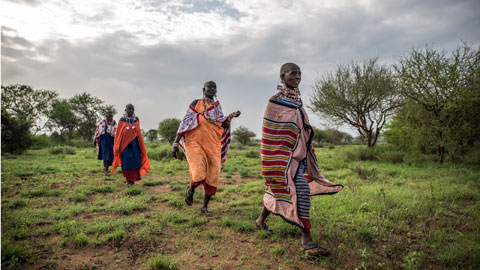Indigenous People Essential to Understanding Environmental Change

An international research involving ICTA-UAB scientists shows how local and indigenous knowledge can help manage ecosystems and wildlife. The study is published in the Journal of Applied Ecology.
29/07/2020
The grassroots knowledge of indigenous people can help to map and monitor ecological changes, and improve scientific studies, according to an international research involving the Institute of Environmental Science and Technology of the Universitat Autònoma de Barcelona (UAB). The study, led by Rutgers University (New Jersey, USA) and published today in the Journal of Applied Ecology, shows the importance of indigenous and local knowledge for monitoring ecosystem changes and managing ecosystems.
The team, in which anthropologist Victoria Reyes-García, ICREA Research Professor at the ICTA-UAB, has participated, collected more than 300 indicators developed by indigenous people to monitor ecosystem changes, and most revealed negative trends, such as increased invasive species or changes in the health of wild animals. Such local knowledge not only influences decisions about where and how to hunt, but also benefits ecosystem management and is important for scientific monitoring.
"Indigenous and local knowledge can complement knowledge in many aspects related to biodiversity management. The synergies of both types of knowledge can be useful to face the loss of biodiversity that we observe," explains Victoria Reyes-García. Many indigenous peoples have unique abilities to notice ecosystems altering before their eyes by using local indicators, like the color of fat in hunted prey or changes in types of species found together. Scientists would not be able to perform these kinds of observations over the long run for many reasons, such as the costs and remoteness of some areas. So indigenous knowledge is essential for understanding the cumulative impacts of biodiversity loss and ecosystem degradation.
Indigenous and local knowledge is the practical information that people use to manage resources and which is passed on through generations. Such knowledge benefits conservation initiatives and economies that depend on natural resources in vast areas of the world.
The study follows the Global Assessment Report on Biodiversity and Ecosystem Services released last year by the Intergovernmental Science-Policy Platform on Biodiversity and Ecosystem Services. That report was the first global ecological assessment to use indigenous and local knowledge as a source of evidence.
The new study, conducted by researchers at many institutions who were involved in the global assessment such as Victoria Reyes-García, provides background on how the report tapped into indigenous knowledge systems and lessons learned. Working with these local sources of information in ecological research and in management requires a deliberate approach from the start, dedicated resources and a commitment to accepting diverse worldviews.
“Partnering with indigenous peoples can help scientists understand how natural and cultural systems are related, identify trends through diverse indicators, and improve sustainable development goals and policies for all,” said Pamela McElwee, lead author and researcher at Rutgers University, New Jersey.
Research article:
McElwee, P., Fernández-Llamazares, A., et al. (2020). Working with Indigenous and local knowledge (ILK) in large-scale ecological assessments: Reviewing the experience of the IPBES Global Assessment. Journal of Applied Ecology. https://besjournals.onlinelibrary.wiley.com/doi/10.1111/1365-2664.13705
This information is related to the following SDG
Climate action